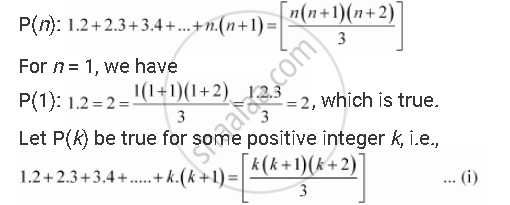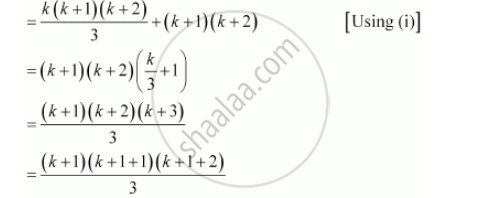Advertisements
Advertisements
Question
Prove the following by using the principle of mathematical induction for all n ∈ N:
1.2 + 2.3 + 3.4+ ... + n(n+1) = `[(n(n+1)(n+2))/3]`
Solution
Let the given statement be P(n), i.e.,

We shall now prove that P(k + 1) is true.
Consider
1.2 + 2.3 + 3.4 + … + k.(k + 1) + (k + 1).(k + 2)
= [1.2 + 2.3 + 3.4 + … + k.(k + 1)] + (k + 1).(k + 2)

Thus, P(k + 1) is true whenever P(k) is true.
Hence, by the principle of mathematical induction, statement P(n) is true for all natural numbers i.e., n.
APPEARS IN
RELATED QUESTIONS
Prove the following by using the principle of mathematical induction for all n ∈ N:
Prove the following by using the principle of mathematical induction for all n ∈ N:
Prove the following by using the principle of mathematical induction for all n ∈ N: `1/2 + 1/4 + 1/8 + ... + 1/2^n = 1 - 1/2^n`
Prove the following by using the principle of mathematical induction for all n ∈ N:
Prove the following by using the principle of mathematical induction for all n ∈ N (2n +7) < (n + 3)2
If P (n) is the statement "n3 + n is divisible by 3", prove that P (3) is true but P (4) is not true.
1 + 2 + 3 + ... + n = \[\frac{n(n + 1)}{2}\] i.e. the sum of the first n natural numbers is \[\frac{n(n + 1)}{2}\] .
2 + 5 + 8 + 11 + ... + (3n − 1) = \[\frac{1}{2}n(3n + 1)\]
a + ar + ar2 + ... + arn−1 = \[a\left( \frac{r^n - 1}{r - 1} \right), r \neq 1\]
a + (a + d) + (a + 2d) + ... (a + (n − 1) d) = \[\frac{n}{2}\left[ 2a + (n - 1)d \right]\]
32n+7 is divisible by 8 for all n ∈ N.
n(n + 1) (n + 5) is a multiple of 3 for all n ∈ N.
Prove that 1 + 2 + 22 + ... + 2n = 2n+1 - 1 for all n \[\in\] N .
\[\text{ A sequence } a_1 , a_2 , a_3 , . . . \text{ is defined by letting } a_1 = 3 \text{ and } a_k = 7 a_{k - 1} \text{ for all natural numbers } k \geq 2 . \text{ Show that } a_n = 3 \cdot 7^{n - 1} \text{ for all } n \in N .\]
\[\text { A sequence } x_1 , x_2 , x_3 , . . . \text{ is defined by letting } x_1 = 2 \text{ and } x_k = \frac{x_{k - 1}}{k} \text{ for all natural numbers } k, k \geq 2 . \text{ Show that } x_n = \frac{2}{n!} \text{ for all } n \in N .\]
\[\text{ A sequence } x_0 , x_1 , x_2 , x_3 , . . . \text{ is defined by letting } x_0 = 5 and x_k = 4 + x_{k - 1}\text{ for all natural number k . } \]
\[\text{ Show that } x_n = 5 + 4n \text{ for all n } \in N \text{ using mathematical induction .} \]
Prove by method of induction, for all n ∈ N:
3 + 7 + 11 + ..... + to n terms = n(2n+1)
Prove by method of induction, for all n ∈ N:
1.2 + 2.3 + 3.4 + ..... + n(n + 1) = `"n"/3 ("n" + 1)("n" + 2)`
Prove by method of induction, for all n ∈ N:
`1/(1.3) + 1/(3.5) + 1/(5.7) + ... + 1/((2"n" - 1)(2"n" + 1)) = "n"/(2"n" + 1)`
Prove by method of induction, for all n ∈ N:
(cos θ + i sin θ)n = cos (nθ) + i sin (nθ)
Answer the following:
Prove, by method of induction, for all n ∈ N
12 + 42 + 72 + ... + (3n − 2)2 = `"n"/2 (6"n"^2 - 3"n" - 1)`
Answer the following:
Prove by method of induction 152n–1 + 1 is divisible by 16, for all n ∈ N.
Give an example of a statement P(n) which is true for all n. Justify your answer.
Prove the statement by using the Principle of Mathematical Induction:
23n – 1 is divisible by 7, for all natural numbers n.
Prove the statement by using the Principle of Mathematical Induction:
32n – 1 is divisible by 8, for all natural numbers n.
Prove the statement by using the Principle of Mathematical Induction:
n3 – n is divisible by 6, for each natural number n ≥ 2.
Prove the statement by using the Principle of Mathematical Induction:
n(n2 + 5) is divisible by 6, for each natural number n.
Prove the statement by using the Principle of Mathematical Induction:
2 + 4 + 6 + ... + 2n = n2 + n for all natural numbers n.
Prove the statement by using the Principle of Mathematical Induction:
1 + 2 + 22 + ... + 2n = 2n+1 – 1 for all natural numbers n.
Show that `n^5/5 + n^3/3 + (7n)/15` is a natural number for all n ∈ N.
Prove that number of subsets of a set containing n distinct elements is 2n, for all n ∈ N.
If 10n + 3.4n+2 + k is divisible by 9 for all n ∈ N, then the least positive integral value of k is ______.
If xn – 1 is divisible by x – k, then the least positive integral value of k is ______.
